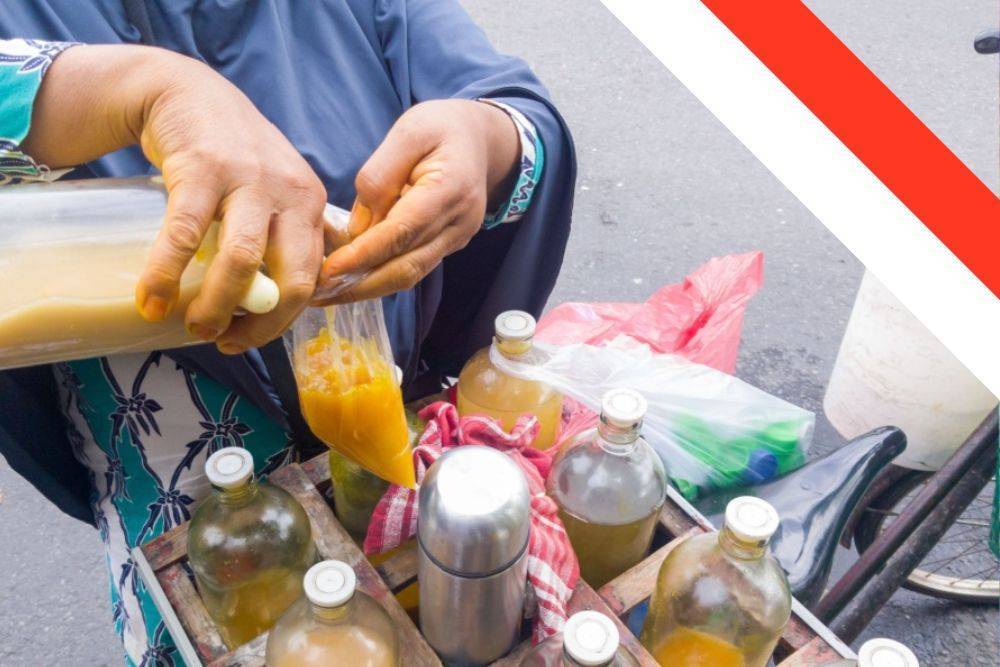Indonesia’s new health law clarifies confusion: Jamu consumption remains safe and legal!
The new health law has caused a viral claim that traditional herbal remedies such as Jamu will be outlawed. However, they have since clarified that the popular drink will not be affected.
Indonesian Health Law Leaves Jamu Consumption Unaffected
The recent enactment of Indonesia’s health law has sparked considerable confusion, particularly regarding traditional herbal remedies, notably jamu. Despite widespread misinformation and public concern, the law does not prohibit the consumption of jamu. Instead, it reaffirms its enduring significance and role within Indonesian culture and healthcare practices. This clarification is crucial, given the importance of jamu to many Indonesians’ daily health regimens. The law aims to integrate modern health regulations while respecting traditional practices. Consequently, the continued use and cultural value of jamu remain protected and acknowledged under the new legislation.
Regulating Traditional Medicine
This legislation aims to oversee Indonesia’s health sector, including traditional medicine comprehensively. This move is significant given traditional medicine’s crucial role in the nation’s healthcare landscape. The law aims to maintain quality and safety standards for conventional medicine by establishing clear production and distribution protocols.
A Longstanding Tradition
Jamu, a traditional Indonesian herbal medicine with a rich history spanning centuries, combines plants, herbs, and spices. These ingredients are believed to possess diverse healing properties. Jamu is a tonic or remedy for various conditions, including digestive disorders, fevers, and skin ailments. Deeply rooted in Indonesian heritage, jamu is often passed down through generations, symbolising cultural and traditional healthcare practices. This ancient remedy reflects Indonesia’s enduring commitment to natural healing methods.
No Ban on Jamu Consumption
Contrary to circulating rumours, the new health law does not prohibit the consumption of jamu. Instead, it regulates the production and distribution of traditional medicines, including jamu, to ensure their safety and quality. Therefore, consumers can continue to purchase and use jamu without any constraints.
Contrary to widespread rumours, the newly implemented health law does not ban the consumption of jamu. Instead, it aims to regulate the production and distribution of traditional medicines, including jamu, to guarantee their safety and quality. As a result, consumers can continue to purchase and use jamu without any restrictions. The law ensures that all traditional medicines meet rigorous standards, thus protecting public health. Consequently, there is no cause for concern regarding the availability of jamu in the market.
Benefits of Jamu
Jamu provides many health benefits, including anti-inflammatory and antioxidant effects, which can help alleviate pain, reduce inflammation, and boost the immune system. Additionally, it is known for its antioxidant qualities, which may help fight chronic diseases such as heart disease and cancer. Beyond its medicinal value, it is culturally significant and frequently enjoyed as a social drink at Indonesian gatherings. This traditional herbal drink is deeply woven into the fabric of Indonesian heritage, reflecting centuries of traditional knowledge and practice. As its popularity continues to grow, highlighting both its health advantages and its role in cultural traditions.
A Look at Indonesia’s Traditional Herbal Medicine
Jamu, a cornerstone of Indonesian health practices for centuries, is a traditional herbal medicine made from a blend of plants, herbs, and spices. These natural ingredients are believed to possess various healing properties, with jamu consumed as a tonic or treatment for various ailments.
What’s in the Mix?
The ingredients in jamu can vary widely, depending on the specific recipe and intended purpose. Here are some common components:
Turmeric: Known for its anti-inflammatory properties, turmeric is often used to address pain and digestive issues.
Ginger: Aiding in digestion and soothing nausea, ginger is a popular ingredient.
Galangal: Similar to ginger, galangal possesses anti-inflammatory properties and may help with respiratory problems.
Tamarind: This tangy fruit adds flavour and can act as a laxative.
Honey: A natural sweetener, honey can contribute to its potential antibacterial effects.
Benefits and Potential Risks
While jamu boasts a long history of use and perceived benefits, it’s essential to consider both sides of the coin.
Potential Benefits
Improved digestion: Many jamu recipes incorporate ingredients like ginger and turmeric, known for aiding digestion.
Reduced inflammation: Turmeric and other ingredients may offer anti-inflammatory properties.
Boosted immune system: Certain herbs and spices used may contribute to a stronger immune system.
Potential Risks
Lack of standardisation: Jamu recipes are not standardised, making it difficult to determine the exact dosage of each ingredient and its potential effects.
Herb-drug interactions: Some herbs used may interact with medications, so consulting a doctor before consuming is crucial, especially if you take prescription drugs.
Safety concerns: Some commercially produced jamu may be adulterated with unsafe substances in rare cases. It’s important to purchase from reputable sources.
The Final Sip
This practice offers a glimpse into Indonesia’s rich herbal tradition. While its potential benefits are intriguing, it’s wise to approach it with caution. Therefore, if you’re considering incorporating jamu into your routine, consult a healthcare professional to ensure its safety and suitability for your needs.
Indonesia’s new health law does not impede the consumption of jamu, a traditional herbal medicine deeply intertwined with the nation’s culture. While the law aims to regulate production and distribution for quality assurance, this form of traditional medicine remains a cherished aspect of Indonesian healthcare practices. Its diverse benefits and cultural significance underscore its enduring relevance in the nation’s holistic approach to wellness.
References:
[1] Health Detik. (n.d.). Viral Narasi UU Kesehatan Baru Larang Konsumsi Jamu, Begini Faktanya. Retrieved from https://health.detik.com/berita-detikhealth/d-7352877/viral-narasi-uu-kesehatan-baru-larang-konsumsi-jamu-begini-faktanya
[2] Suparmi, S., Wahidin, D., & Rietjens, I. M. C. M. (2021). Risk characterisation of jamu to promote its safe use. Critical Reviews in Toxicology, 51(2), 183-191. DOI: 10.1080/10408444.2021.1912708
[3] Handayani, L., & Suharmiati. (2002). Meracik Obat Tradisional Secara Rasional. Medika, 648-651.
[4] Kompas. (2023, December 12). The status of herbal medicine as a world cultural heritage must have an impact. Retrieved from https://www.kompas.id/baca/english/2023/12/12/en-status-jamu-sebagai-warisan-budaya-dunia-unesco-harus-berdampak
Have a pressing question for a doctor? Medical Channel Asia has launched a community forum page where you can get questions answered by a medical specialist. Visit the community forum here.

